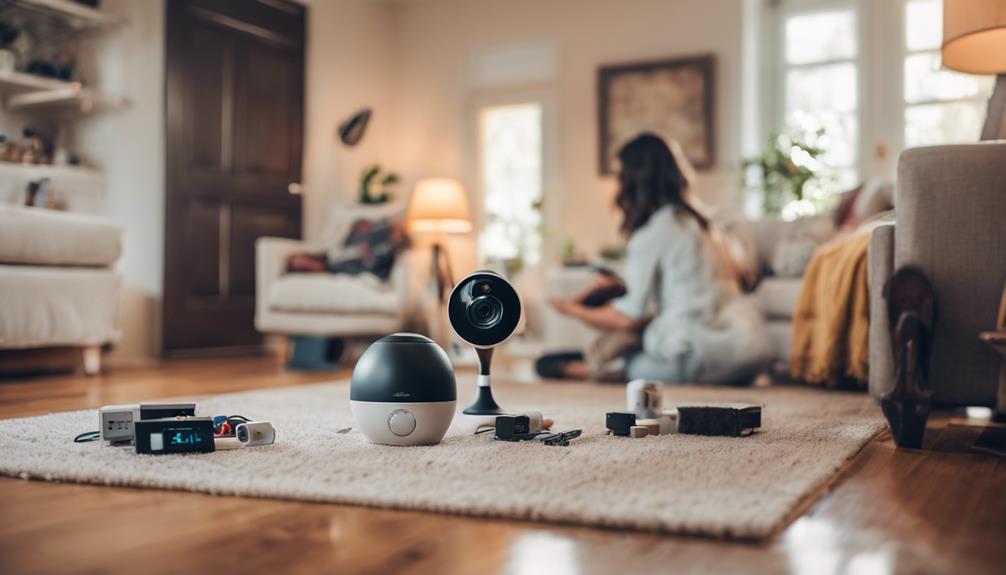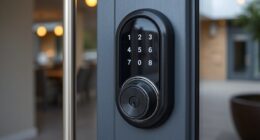You can expect to spend about $490 on a home security system for better safety and peace of mind. If you want to save, DIY options start at around $200. For more extensive setups with advanced features, costs can go above $1,200. Plus, don't forget ongoing expenses, like monthly monitoring fees, which typically range from $10 to $60, averaging about $31.65. Depending on your needs and budget, you might choose self-monitoring or professional services. There's a lot more to evaluate when choosing the right system for your home, so keep exploring your options.
Key Takeaways
- The average expenditure on home security systems is around $490.
- DIY security system packages start at approximately $200, offering budget-friendly options.
- Professional installation can range from $100 to $400, increasing overall costs.
- Monthly monitoring fees typically range from $10 to $60, averaging around $32.
Average Costs of Home Security Systems
When it comes to home security systems, you can expect to spend an average of around $490, with options ranging from budget-friendly DIY setups to high-end professional installations.
If you're considering a DIY security system, you can find packages starting around $200, making them an appealing choice for those on a tighter budget. However, extensive systems with advanced features can easily exceed $1,200, depending on the security equipment you choose.
For professional installations, the costs can escalate quickly, with prices typically ranging from $100 to $400 for installation fees.
If you opt for professional monitoring, be prepared for monthly monitoring fees, which generally range from $10 to $60, with an average of $22 to $35 for professional services.
If you're investing in security cameras, remember that they often require additional costs for installation and equipment.
Installation Methods and Expenses

There are two primary installation methods for home security systems: DIY options that save you money and professional installations that offer convenience but come with additional costs. If you opt for DIY installation, you'll likely avoid installation costs altogether, making it an attractive choice for budget-conscious homeowners. On the other hand, professional installation can range from $280 to $1,150, depending on the complexity of your chosen system.
Here's a quick comparison of installation options:
| Installation Type | Average Cost Range | Activation Fees |
|---|---|---|
| DIY Installation | $0 | None |
| Professional Installation | $280 – $1,150 | Up to $230 |
| Wireless Systems | $200 – $2,000 | Varies by provider |
| Wired Systems | $800 – $1,600 | Some include no fees |
| Home Security Companies | Varies by brand | Often waived with plan |
When considering your options, remember that while DIY installation saves you upfront costs, professional installations may include monitoring services, which can affect your long-term budget.
Monthly Monitoring Fees

When it comes to monthly monitoring fees, you'll typically see costs ranging from $10 to $60, with most people paying around $32.
You can choose between self-monitoring options, which can be as low as $4.99, and professional services that usually fall between $22 and $35.
Understanding these differences can help you make the best choice for your home security needs.
Average Monthly Costs
What should you expect to pay for monthly monitoring fees when evaluating a home security system? The average monthly costs can vary considerably, depending on whether you choose professional monitoring or self-monitoring services. Generally, you'll find that professional monitoring averages about $31.65 per month, while self-monitoring services typically cost around $10.
Here's a quick comparison of popular providers:
| Provider | Monitoring Type | Monthly Fee |
|---|---|---|
| Abode | Professional | $24.99 |
| Ring | Self-Monitoring | Starting at $10 |
| Frontpoint | Professional | $49.99 |
| Wyze | Self-Monitoring | $2.99 |
These customizable plans allow you to select monitoring services that fit your budget and needs. Keep in mind that cumulative costs can add up over time, much like your cell phone expenses. As a result, it's crucial to evaluate your long-term financial considerations when choosing an affordable monitoring solution. Whether you prioritize extensive coverage or a budget-friendly option, understanding these average monthly costs will help you make an informed decision.
Self-Monitoring Vs. Professional
Deciding between self-monitoring and professional monitoring often hinges on cost, with self-monitoring averaging around $10 per month compared to professional fees that typically range from $22 to $35.
For homeowners looking for an affordable option, self-monitoring can be an attractive choice. Providers like Abode and Ring offer self-monitoring plans for as low as $4.99 to $6.99 monthly, making it a budget-friendly investment.
However, it's important to evaluate the benefits of professional monitoring. While the monthly fees can accumulate, reaching $300 or more annually, these services provide quick emergency response, which can be vital during a crisis. With self-monitoring, you're responsible for taking action in emergencies, which might compromise safety.
Some systems, such as Vivint, don't even offer self-monitoring, charging between $40 to $60 for professional services. This reflects a significant investment for ongoing security oversight.
Ultimately, the choice between self-monitoring and professional monitoring depends on your priorities and budget. If you value cost savings and are willing to take on more responsibility, self-monitoring could be the right fit. However, if peace of mind and immediate response are your priorities, professional monitoring might be worth the additional costs.
Types of Home Security Systems

When choosing a home security system, you'll need to evaluate whether you want a DIY setup or a professionally installed option.
Additionally, you'll face the choice between wired and wireless systems, each with its own advantages and costs.
Understanding these types helps you make an informed decision that fits your needs and budget.
DIY Vs. Professional Systems
Choosing between DIY and professional home security systems can greatly impact your budget and peace of mind.
DIY home security systems usually start at around $200, making them an attractive option for those looking to save on equipment costs. Popular DIY options like Ring and SimpliSafe offer packages ranging from $199 to $599, and their wireless home security systems can be easily set up with minimal installation and activation required.
On the other hand, professional installation generally averages around $600, with costs for wired systems reaching between $800 and $1,600. While professional systems, such as those from ADT and Vivint, may provide thorough monitoring features, you'll need to factor in ongoing monitoring costs, which can range from $20 to $60 monthly.
Many security companies offer both DIY and professional installation, with some even providing free installation for monitored systems. Thus, it's important to compare the average costs and services based on your personal security needs.
Ultimately, the choice between DIY and professional systems will hinge on your budget, desired features, and comfort with technology.
Wired Vs. Wireless Options
Homeowners often find themselves weighing the pros and cons of wired versus wireless security systems to determine which best suits their needs.
Wired home security systems typically come with higher installation costs, ranging from $800 to $1,600, due to the need for professional installation. In contrast, wireless systems are more budget-friendly, with prices between $200 and $2,000, and offer ease of installation that allows you to set them up without expert help.
While wired systems provide excellent reliability and aren't affected by signal interference, making them ideal for larger homes, they lack the flexibility that wireless options offer. Wireless systems enable you to easily relocate or expand your security setup without the hassle of rewiring.
Both types can integrate with smart home technology, but wireless systems are especially popular for their features like remote access and mobile notifications, giving you greater control over your home security.
Ultimately, your choice between wired and wireless systems will depend on your priorities regarding installation costs, reliability, and flexibility.
Factors Affecting Security Costs

Several factors influence the costs of a home security system, including installation type, home size, and additional features.
The average cost of a home security system hovers around $490, but this can vary based on your choices. If you opt for a DIY installation, you'll save on labor costs, but professional installation can range from $100 to $1,150. The size of your home also plays a vital role; larger homes typically require more equipment, such as cameras and alarms, leading to higher total expenses.
Monthly monitoring costs can greatly impact your long-term investment. You might pay as little as $10 for self-monitoring or up to $60 for professional services.
Don't forget about additional features, either—smart home integration and environmental sensors can add to your initial setup cost. Activation fees for monitored systems can reach up to $230, and you might also face annual maintenance costs of around $10 for battery replacements and upkeep.
All these factors combined can lead to a substantial difference in what you end up spending on your home security system.
Money-Saving Strategies

Consider implementing money-saving strategies to reduce the overall cost of your home security system. By being smart about your choices, you can enjoy substantial savings while keeping your home safe. Here are some effective strategies:
- Opt for DIY installation: Systems like Ring and Wyze offer packages starting around $200, compared to professional installation costs ranging from $280 to $1,150.
- Choose self-monitoring plans: These can reduce monthly fees to as low as $4, while professional monitoring averages between $22 and $35.
- Shop around for deals: Many security companies provide promotions or discounts. Comparing bundled services can lead to reduced rates.
Additionally, consider that installing home security systems may qualify you for insurance discounts of 2% to 20% on your homeowners insurance. This can further offset costs over time, making your investment in safety more affordable.
Benefits of Home Security Systems

A reliable home security system offers peace of mind by deterring criminals and ensuring your property is monitored around the clock. With 87% of burglars deterred by alarms and security features, installing these systems greatly enhances burglary prevention. The presence of security cameras and signage not only keeps your home safe but also signals to potential intruders that you're serious about security.
Additionally, having professional monitoring services means quick emergency responses. In the event of a breach or alarm, authorities are alerted immediately, increasing your chances of preventing theft. Many homeowners report feeling more secure, especially during vacations, knowing their property is under constant surveillance.
Moreover, you can save money too. Many insurance companies offer homeowners insurance discounts of up to 20% for those with home security systems, helping to offset the initial costs. In fact, these discounts can significantly reduce your overall expenses in the long run. By taking advantage of **home security savings on insurance**, you not only improve your safety but also make your home more affordable to protect. Over time, these savings can add up, making the initial investment in a home security system even more worthwhile.
Ultimately, investing in a home security system not only protects your belongings but also brings invaluable peace of mind. With the right security features in place, you can rest easy knowing your home and loved ones are safe.
Frequently Asked Questions
How Much Do People Spend on Home Security?
People typically spend varying amounts on home security, depending on their needs and preferences. You might find basic systems for a couple hundred dollars, while extensive options can reach over a thousand, plus monthly monitoring fees.
Is It Worth It to Get a Home Security System?
Imagine a neighbor's break-in that could've been prevented by a security system. Investing in one not only deters crime but also saves you from potential losses, making it well worth the initial cost and ongoing fees.
How Much Does It Cost to Put an Alarm System in Your House?
Installing an alarm system in your house can cost between $200 for DIY setups and up to $600 for professional installations. Additional fees may apply, like monthly monitoring, which typically ranges from $25 to $50.
How Much Does a Security System Add to Home Value?
A security system can boost your home's value by 5% to 20%. It makes your property more appealing to buyers, helping it sell faster and potentially earning you discounts on insurance premiums.
Conclusion
In the end, investing in a home security system isn't just about protecting your property; it's about safeguarding your peace of mind.
Think of it as a shield against the uncertainties of life, where the cost pales in comparison to the comfort you'll feel knowing your loved ones are safe.
So, take that step today—your home deserves it, and so do you.
After all, a secure home is a happy home.









